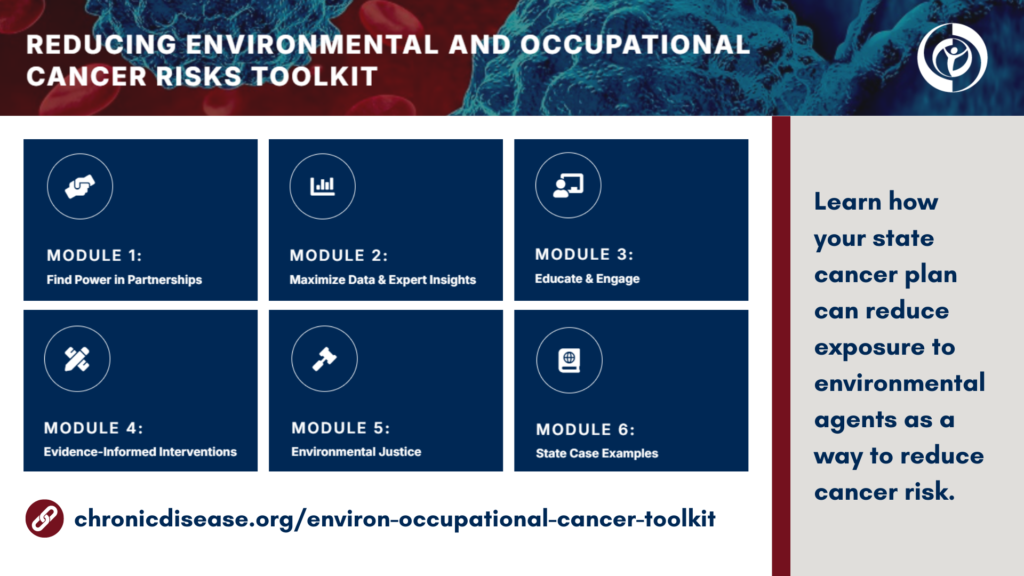
NACDD’s new Healthy Aging webpages invite Members to explore how integrating Alzheimer’s messages into chronic disease programs can support reducing risks related to cognitive decline. The updated webpages provide a more streamlined user experience, making it easier to find data, health education messaging, and promotional materials about healthy aging, Alzheimer’s Disease, and related dementias.
The launch also includes multiple new health promotion products, including data briefs, rack cards in four new languages, and a dementia risk reduction video for Black adults in Spanish and English. In partnership with the Centers for Disease Control and Prevention, NACDD developed these dementia risk reduction resources to support public health professionals to integrate Alzheimer’s messages into their chronic disease programs.
Risk reduction rack cards are now available for blood pressure, blood sugar, nutrition, physical activity, hearing impairment, sleep, and traumatic brain injury. They are available in English, Spanish, Cantonese, Vietnamese, Tagalog, and Ilocano.
Data briefs for subjective cognitive decline and caregiving are now available. These updated briefs analyze data from the 2018-2022 Behavioral Risk Factor Surveillance System. They feature national maps that provide a state-by-state analysis of the data.
NACDD’s new dementia risk reduction video encourages the health and well-being of Black adults by sharing healthy lifestyle choices that can reduce the risk of cognitive decline. This animated video is available in English and Spanish. It uses simple, conversational language to promote good nutrition and physical activity among mid- and later-life Black persons.
Why is it important to include messages about cognitive decline in chronic disease programming?
One study of how a combination of healthy lifestyle traits may substantially reduce Alzheimer’s, found that, compared to participants with no or just one healthy lifestyle factor, the risk of Alzheimer’s was 37% lower in those with two to three healthy lifestyle factors, and 60% lower in those with four to five healthy lifestyle factors.[i]
These findings are further supported by the Lancet Commission’s 2020 Report that says modifying certain risk factors could prevent or delay up to 40% of dementias. These risk factors include less education, hypertension, hearing impairment, smoking, obesity, depression, physical inactivity, diabetes, low social contact, excessive alcohol consumption, TBI, and air pollution.[ii]
It is critical to recognize that chronic diseases are also risk factors for dementia and to expand current chronic disease risk reduction messages to include brain health. According to the Alzheimer’s Association, 6.9 million Americans age 65 and older are living with Alzheimer’s. The annual number of new cases of Alzheimer’s and other dementias is projected to double by 2050.[iii]
By taking healthy actions now – that also reduce the risk for other chronic diseases like diabetes and cardiovascular disease – people can reduce their risk for developing dementia later in life. Explore our new Healthy Aging webpages today to learn more about Alzheimer’s disease and access risk reduction resources.
[i] Dhana, K., Evans, D. A., Rajan, K. B., Bennett, D. A., & Morris, M. C. (2020). Healthy lifestyle and the risk of Alzheimer dementia. Neurology, Volume 95, Number 4(July 28, 2020). https://doi.org/10.1212/WNL.0000000000009816
[ii] Livingston, G., Huntley, J., Sommerlad, A., & Ames, D., et all. (2020). Dementia prevention, intervention, and care: 2020 report of the Lancet Commission. The Lancet, 396(10248), 413-446. https://doi.org/10.1016/S0140-6736(20)30367-6
[iii] Gaugler, J., James, B., Johnson, T., Reimer, J., Scales, K., Tom, S., Weuve, J., & Yeh, J. (2024, May 20). 2024 Alzheimer’s Disease Facts and Figures. Alzheimer’s Association. Retrieved July 26, 2024, from https://www.alz.org/media/documents/alzheimers-facts-and-figures.pdf

